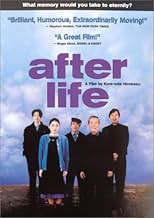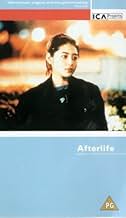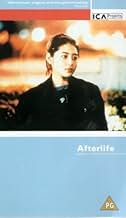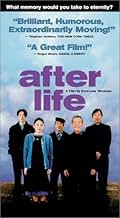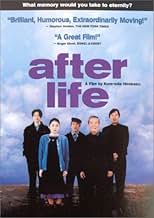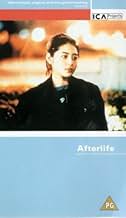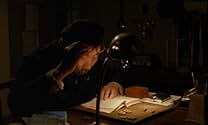After death, people have a week to choose only one memory to keep for eternity.After death, people have a week to choose only one memory to keep for eternity.After death, people have a week to choose only one memory to keep for eternity.
- Awards
- 7 wins & 8 nominations total
Arata Iura
- Takashi Mochizuki, counselor
- (as Arata)
- Director
- Writer
- All cast & crew
- Production, box office & more at IMDbPro
Featured reviews
this movie was lovely. i could relate to the people and what they chose as their memories. i wanted to find a memory but i couldn't find one i would want to spend eternity with. so this movie has actually made me want to create beautiful memories before it is too late. see this movie, it might make you evaluate your own life.
I saw this movie in the theatre. It is always a pleasure to be at a viewing where there is spontaneous applause at the end. This is one of those movies. It speaks to your very soul. I understand that quite a few of the cast were not professional actors, but spoke from their own lifetime experiences. There is a very simple premise: you get to choose the most favourite moment of your life after you are dead and then help to recreate it, staging, cast of characters, scene - and the total non-professional manufacturing of this moment I found very touching - so that it can be savoured for all eternity. The perfect heaven. Of course some recently dead people can't think of anything, some remember very simple things, some are given assistance, like the record of their entire life in video form to review and extract a memory, if they can. The cast and direction is brilliant. I shudder to think of what modern Hollywood would do with this ("What dreams may come" being a case in point). It was all extremely simple and believable and has certainly had me talking about it for quite a while since I have seen it. 8 out of 10.
Afterlife is another film offering an answer to the unanswerable question "What happens after you die? ". Although this has been asked many times through cinema in the past, few films have answered as elegantly as Afterlife.
Directly after dying the departed are received by a group of counsellors who assist them in finding what was, for them, the most beautiful and perfect, single experience of their lives. For some the choice is easy and they are instantly able to provide the moment, which, once recreated by technicians, they remain in forever but the majority of the film concentrates upon those who are unable to find their perfect moment, and need extra help to recall past loves and lost days of their youth. The institution has the perfect means to assist this choice, with the complete life of everyone on grainy home-video, perhaps a comment on the tehcnology and recording-obsessed Japanese.
Many of the scenes are visually exceptional, especially those in the snow and everything seems very real, and, ironically, down-to-earth, especially the school building being used throughout the film giving an institutional feeling, but the interaction between the staff is where the film holds its true strength. Especially interesting is the relationship between Shiori, a newly employed worker, and Mochizuki, her mentor, which develops throughout. The film is slow to start due to the documentary style often used, but proceeds in an enveloping manner holding your attention to the end. Along with "Heaven can wait" and "Beetlejuice" this film offers another novel look at life, death and the hereafter.
The Japanese title was "Wandafuru raifu" (wonderful life, after Frank Capra) and, even though the film is dealing with death, it is a statement of how wonderful life is.
I loved this film and it stuck me stunningly and reminded me of how good films can be when they try.
Directly after dying the departed are received by a group of counsellors who assist them in finding what was, for them, the most beautiful and perfect, single experience of their lives. For some the choice is easy and they are instantly able to provide the moment, which, once recreated by technicians, they remain in forever but the majority of the film concentrates upon those who are unable to find their perfect moment, and need extra help to recall past loves and lost days of their youth. The institution has the perfect means to assist this choice, with the complete life of everyone on grainy home-video, perhaps a comment on the tehcnology and recording-obsessed Japanese.
Many of the scenes are visually exceptional, especially those in the snow and everything seems very real, and, ironically, down-to-earth, especially the school building being used throughout the film giving an institutional feeling, but the interaction between the staff is where the film holds its true strength. Especially interesting is the relationship between Shiori, a newly employed worker, and Mochizuki, her mentor, which develops throughout. The film is slow to start due to the documentary style often used, but proceeds in an enveloping manner holding your attention to the end. Along with "Heaven can wait" and "Beetlejuice" this film offers another novel look at life, death and the hereafter.
The Japanese title was "Wandafuru raifu" (wonderful life, after Frank Capra) and, even though the film is dealing with death, it is a statement of how wonderful life is.
I loved this film and it stuck me stunningly and reminded me of how good films can be when they try.
The underlying premise and theme of this film is extremely thought-provoking. Within the first 20 minutes, your brain will light up like a Christmas tree as you think of the implications and how you would react in a similar situation. It has the magical ability to awaken nostalgic memories of your own, and several times I had to pause the film so that I could indulge my own private thoughts for a while. Hats off to the director/writer for achieving the necessary balance between fantasy and realism (i.e., taking you to a surreal place whilst not destroying the human perspective).
But the downside... I feel that the director failed to cultivate some of the excellent philosophies which were barely touched upon. This could have been accomplished with more dialogue. Don't get me wrong, there's plenty of *talking* in the movie, but it's mostly anecdotal (people wistfully reminiscing about the past). There wasn't enough analysis and barely any *dialogue* (people communicating with each other).
Without ruining anything, I'll give you one example. The premise is, of course, "if you had to pick one memory to relive forever, which would you choose?" One character simply refuses to pick. This is brilliant. As soon as he takes his position, which he does in the first 10 minutes of the film, it woke me up and made me wonder why he would choose this unconventional act of defiance.
But much to my disappointment, this central theme is abandoned. The character is hardly seen again. He does deliver an interesting monologue towards the end which is encapsulated in a single powerful statement he says (I won't tell you what it is). But I couldn't help feeling as if the director didn't really follow through with his philosophy.
Perhaps that was the intent of the director: to present us only with fragments so that we may ponder the philosophy ourselves. But that approach somewhat betrays the nature of art. Art, I believe, should do its best to communicate a complete idea, and *then* open up the floor for discussion. Anything less is a mere Rorshach test. Or whatever you call those inkblot thingees that psychologists use to probe your mind.
As you can probably guess, I'm not a big fan of the Minimalist movement.
Another gripe... Some of the interesting philosophical points were shoved aside to make room for the romantic sub-plot, which I found to be a bit forced and unbelievable. I would have preferred to see the director stick to the heavier issues. If this is truly a film about deep spirituality, why dedicate so much time to a teenage girl's crush on a guy?
So my overall criticism is that there wasn't enough substance presented. I admit there IS the possibility that the dialogue/philosophy I craved was lost in translation. It is possible that the English subtitles didn't convey the philosophy inherent in the original Japanese. That's been known to happen.
But still, I think this film could have truly benefited by a good old fashioned Shakespearian soliloquy, like Hamlet Act III Sc 1, to help clarify the director's message.
Well, here I've wasted my whole review babbling about philosophy, and I haven't touched upon the technical merits of this film. Let me just wrap up by reiterating that THIS IS A GOOD FILM despite my criticism. I love the way the director achieved a surreal feeling without using gimmicky, schlocky clichés like pearly gates and angels and pixie dust. Everything about the production is firmly rooted in reality despite the very unrealistic nature, and that achieves a very bizarre and clever paradox. Also there's no music at all. It's an original, I'll definitely give it that! Give it a whirl. I'll probably watch it a 2nd time myself.
But the downside... I feel that the director failed to cultivate some of the excellent philosophies which were barely touched upon. This could have been accomplished with more dialogue. Don't get me wrong, there's plenty of *talking* in the movie, but it's mostly anecdotal (people wistfully reminiscing about the past). There wasn't enough analysis and barely any *dialogue* (people communicating with each other).
Without ruining anything, I'll give you one example. The premise is, of course, "if you had to pick one memory to relive forever, which would you choose?" One character simply refuses to pick. This is brilliant. As soon as he takes his position, which he does in the first 10 minutes of the film, it woke me up and made me wonder why he would choose this unconventional act of defiance.
But much to my disappointment, this central theme is abandoned. The character is hardly seen again. He does deliver an interesting monologue towards the end which is encapsulated in a single powerful statement he says (I won't tell you what it is). But I couldn't help feeling as if the director didn't really follow through with his philosophy.
Perhaps that was the intent of the director: to present us only with fragments so that we may ponder the philosophy ourselves. But that approach somewhat betrays the nature of art. Art, I believe, should do its best to communicate a complete idea, and *then* open up the floor for discussion. Anything less is a mere Rorshach test. Or whatever you call those inkblot thingees that psychologists use to probe your mind.
As you can probably guess, I'm not a big fan of the Minimalist movement.
Another gripe... Some of the interesting philosophical points were shoved aside to make room for the romantic sub-plot, which I found to be a bit forced and unbelievable. I would have preferred to see the director stick to the heavier issues. If this is truly a film about deep spirituality, why dedicate so much time to a teenage girl's crush on a guy?
So my overall criticism is that there wasn't enough substance presented. I admit there IS the possibility that the dialogue/philosophy I craved was lost in translation. It is possible that the English subtitles didn't convey the philosophy inherent in the original Japanese. That's been known to happen.
But still, I think this film could have truly benefited by a good old fashioned Shakespearian soliloquy, like Hamlet Act III Sc 1, to help clarify the director's message.
Well, here I've wasted my whole review babbling about philosophy, and I haven't touched upon the technical merits of this film. Let me just wrap up by reiterating that THIS IS A GOOD FILM despite my criticism. I love the way the director achieved a surreal feeling without using gimmicky, schlocky clichés like pearly gates and angels and pixie dust. Everything about the production is firmly rooted in reality despite the very unrealistic nature, and that achieves a very bizarre and clever paradox. Also there's no music at all. It's an original, I'll definitely give it that! Give it a whirl. I'll probably watch it a 2nd time myself.
"When we come to the last moment of this lifetime and we look back across it, the only thing that's going to matter is 'What is the quality of our love?" - Richard Bach
One of the most commonly reported aspects of near-death experiences is the life review, the seeing and re-experiencing of major and trivial events of one's life, sometimes from the perspective of the other people involved. Most say that the single most important lesson they learned is that the actions we think are trivial and unimportant turn out to be the most important, especially ones that involve spontaneous acts of love. While not exactly a life review, in After Life by Hirokazu Koreeda, a group of recently deceased people are asked to look back at their life and choose only one memory from their life that they want to take with them to eternity. The process compels people to look at their life in its entirety and see what worked and what was missing.
Set in a dreary barracks-like way station, civil servants meet with those just crossed over to help them choose the experience they want to hold on to. For some, the choice is easy, for others it is difficult. Those that will not or cannot choose are consigned to work in the substation with the newly deceased until they are ready to move on. The counselors work one on one with each individual telling them that they have three days to make their choice. Once a memory is selected, a film crew recreates the memory-- sets are built and the little touches of sights and sounds are selected until the deceased are satisfied that they are witnessing a perfect recreation of their experience. It is that film that they take with them, not the original memory.
At first some choose things such as a trip to Disneyland, a sexual encounter, or a memorable bowl of rice but later gravitate toward experiences that are more meaningful. The center of the film revolves around those who are unable to choose. Ichiro Watanabe (Taketoshi Naito) is a 70-year old management consultant who has led an uneventful life and is challenged to find a memory he thinks is worth preserving for all time. To help him in this process, he is allowed to scan through piles of videotapes representing each year of his life. One young man wants to choose a dream instead of an actual event. Another wants to forget his past entirely, and an elderly woman is stuck in the mindset of a nine-year old girl.
After Life is the story of the caseworkers as well. Takashi Mochizuki (Arata) has been stuck in limbo because he cannot find any happiness in his twenty-two years until he realizes how his short life deeply affected someone else. His perfect realization also affects a co-worker Shiori (Erika Oda) who has fallen in love with him. After Life is a beautiful and touching film that allows us to reflect on the things that brought us joy in our own life, and to recognize that true happiness lies, not in outward symbols of success, but in giving ourselves to others.
One of the most commonly reported aspects of near-death experiences is the life review, the seeing and re-experiencing of major and trivial events of one's life, sometimes from the perspective of the other people involved. Most say that the single most important lesson they learned is that the actions we think are trivial and unimportant turn out to be the most important, especially ones that involve spontaneous acts of love. While not exactly a life review, in After Life by Hirokazu Koreeda, a group of recently deceased people are asked to look back at their life and choose only one memory from their life that they want to take with them to eternity. The process compels people to look at their life in its entirety and see what worked and what was missing.
Set in a dreary barracks-like way station, civil servants meet with those just crossed over to help them choose the experience they want to hold on to. For some, the choice is easy, for others it is difficult. Those that will not or cannot choose are consigned to work in the substation with the newly deceased until they are ready to move on. The counselors work one on one with each individual telling them that they have three days to make their choice. Once a memory is selected, a film crew recreates the memory-- sets are built and the little touches of sights and sounds are selected until the deceased are satisfied that they are witnessing a perfect recreation of their experience. It is that film that they take with them, not the original memory.
At first some choose things such as a trip to Disneyland, a sexual encounter, or a memorable bowl of rice but later gravitate toward experiences that are more meaningful. The center of the film revolves around those who are unable to choose. Ichiro Watanabe (Taketoshi Naito) is a 70-year old management consultant who has led an uneventful life and is challenged to find a memory he thinks is worth preserving for all time. To help him in this process, he is allowed to scan through piles of videotapes representing each year of his life. One young man wants to choose a dream instead of an actual event. Another wants to forget his past entirely, and an elderly woman is stuck in the mindset of a nine-year old girl.
After Life is the story of the caseworkers as well. Takashi Mochizuki (Arata) has been stuck in limbo because he cannot find any happiness in his twenty-two years until he realizes how his short life deeply affected someone else. His perfect realization also affects a co-worker Shiori (Erika Oda) who has fallen in love with him. After Life is a beautiful and touching film that allows us to reflect on the things that brought us joy in our own life, and to recognize that true happiness lies, not in outward symbols of success, but in giving ourselves to others.
Did you know
- TriviaMuch of the action in After Life is shown as interviews conducted with the recently deceased regarding their lives. Some of these interviews were scripted, but many were done impromptu, with real people (not actors) reminiscing about their own lives.
- Quotes
Kenji Yamamoto, who wants to forget his past: Say I choose a memory, from when I was eight or ten years old. Then I'll only remember how I felt back then? I'll be able to forget everything else? Really? You can forget? Well, then that really is heaven.
- How long is After Life?Powered by Alexa
Details
Box office
- Gross US & Canada
- $801,985
- Opening weekend US & Canada
- $11,791
- May 16, 1999
- Gross worldwide
- $801,985
Contribute to this page
Suggest an edit or add missing content



